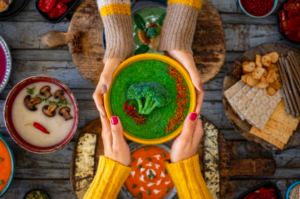‘Day-to-day things, the mundane, are what keeps the motor running. How extraordinary the ordinary really is, a tool we all use to keep going, a template for sanity.’
Ceceilia Ahern
I was first drawn to write about peace and transcendence, the subject of this series of museum pieces, by a desire to explain a particular moment in which I felt peaceful: the act of dipping a chunk of bread into a steaming, life-giving soup on a cold day. I know that soup makes a lot of people feel peaceful; soup rejuvenates, it brings us together as families and communities. But how do we find peace in the mundane, the everyday? This piece, the final in a series of three parts on peace and transcendence, will discuss self-transcendence in our everyday lives.

The previous piece in this series discussed self-transcendence in awe-inspiring situations, those times in life where you are stunned into escaping your ego, rendered small by the context of your surroundings. But we can also transcend ourselves in the everyday. When the perfect song comes on the radio; when you take the washing down from the line and catch their fresh scent; when a hug is so good it transports you to another place. These experiences cause self-transcendence: they take you out of yourself, out of context, where your problems can’t find you, albeit only for a moment.
Seeking out these modes of self-transcendence is now a big business. Meditation, mindfulness, journaling, drawing; there are plenty of methods that people deploy to try and leave their problems behind. Practicing everyday mindfulness can make you appreciate the mundane in a new light, but mindfulness and meditation are journeys, rather than definite ends. Being present in this way allows us to identify the beauty in the everyday, and be more at peace with our surroundings. The author Gretchen Rubin focuses on ‘bringing happiness from the transcendent to the concrete’, with a current focus on utilising all five senses in the pursuit of peace and joy. Similarly, introspective writing can allow us to reflect on our everydays and find peace through that reflection. Staying present is important in self-transcendence, it allows us to escape our ego and recognise our limitations.
These techniques for transcendence are important in finding peace with ourselves and the world, but can never truly emulate those spontaneous, infinitely personal moments in which sudden self-transcendence simply happens. Just as awe and the extremes of stimulation are random and improbable, so transcending the everyday must be too. But, whilst the awe-inspiring stays with us for much of our lives (we can all remember a breath-taking view), the everyday fades quickly into an irredeemable blur. This, I think, is where the utility of techniques such as journaling lie; chronicling the everyday makes it special, memorable. As the author Annie Dillard says, ‘the way we spend our days is the way we spend our lives’. Remembering those days allows us to recall those beautiful moments of transcendence that made us feel peaceful.

Remembering everyday transcendence is as much about sharing narratives as it is recording them. Moments such as that first spoonful of soup are reinforced through the narratives that people share about soup. Chicken Soup for the Soul, a ‘socially conscious storytelling company’, have used the power of personal narratives to spread peace and happiness through their book series, with titles such as ‘The Forgiveness Fix’ and ‘Lessons Learned from My Cat’. With over 250 books produced, there is a clear appetite for sharing personal narratives of transcendence. Hearing how other people experience transcendence in cycling through a park they’ve never visited or looking at the same moon as your family members on the other side of the globe, reminds us of those moments in our own lives, and gives us hope for more of them in the future.
How can we make use of everyday transcendence beyond personal peace? Is there a way in which personal reflection can sit alongside high-level negotiations and peacebuilding? Perhaps such meetings could begin with the sharing of some soup – from which personal stories might follow. Peace scholars such as the pre-eminent Johann Galtung, have begun to employ elements of transcendence in their work on peace mediation, albeit within the framework of norms and rules on how peace should be negotiated.[1] Maybe military leaders should dry their laundry together, just as they hang up the clothes of those they love.
From the awe-inspiring to the ordinary, moments of self-transcendence can help us to recognise the boundaries of our individual existence and how to go beyond them. How to see the benefits of connection with the world around you and those who inhabit it. Making peace is about being at ease with yourself and others, and with the natural world, and these brief moments of transcendence, these pockets of idealism we temporarily inhabit, let us glimpse this utopia. While breathtaking views and out-of-this-world experiences can be impressive and memorable, there is something equally wonderful in our ability to find utopias in the everyday.
What do you think?
- Where do you find peace in the everyday?
- Does the mundane deserve to be thought of as peaceful? Or can we only find joy and happiness in the extraordinary?
- How can we scale up those passing moments of mundane, personal peace so that they enhance our interpersonal relations and the peace we build with others?
- If peace negotiations were based on sharing narratives of everyday transcendence, what might peace treaties look like?
If you enjoyed this item in our museum…
You might also enjoy Hyacinths, The Inner Peace of Mary Oliver’s Poetry, Place is the Path to Peace, Pockets of Peace in St Andrews, Mindful Peace with Haemin Sunim, Om Shanti, Peace through Movement, and the other items in this series: ‘Peace as Transcendence‘ and ‘Awe-Inspiring Experiences‘.
[1] Galtung, J., 2000, ‘Conflict Transformation by Peaceful Means (The Transcend Method)’, participants’ and trainers’ manual, United Nations Disaster Management Training Programme, Geneva
Joe Walker, April 2023